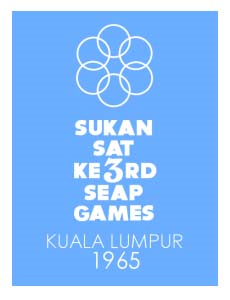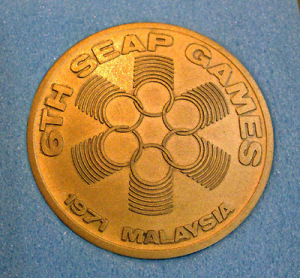
SEA Games, officially known as the South East Asian Games and abbreviated as SEAG, is a biennial multi-sport event involving participants from the current 11 countries of Southeast Asia. The games are under the regulation of the Southeast Asian Games Federation with supervision by the International Olympic Committee (IOC) and the Olympic Council of Asia (OCA).

The 1959 Southeast Asian Peninsular Games, officially known as the 1st Southeast Asian Peninsular Games, was the first and inaugural edition of the biennial multi-sport event for Southeast Asian athletes, organised by the SEAP Games Federation. It was held in Bangkok, Thailand from 12 to 17 December 1959 with 12 sports featured in the games. Cambodia, one of the six founding members of the SEAP Games Federation, did not compete at the inaugural edition. For the first time and first among all Southeast Asian nations, Thailand hosted the Southeast Asian Peninsular Games, which later known as the Southeast Asian Games. The games was opened and closed by Bhumibol Adulyadej, the King of Thailand at the Suphachalasai Stadium. The final medal tally was led by host Thailand, followed by its neighbouring countries, Burma and Malaya.

The 1961 Southeast Asian Peninsular Games, officially known as the 2nd Southeast Asian Peninsular Games, was a Southeast Asian multi-sport event held in Rangoon, Burma from 11 to 16 December 1961 with 13 sports featured in the games. This was the first time all six founding members of the SEAP Games Federation competed in the biennial sports festival and the first time Myanmar, then known as Burma hosted the games. Burma, later known as Myanmar is the second country to host the Southeast Asian Peninsular Games, which later known as the Southeast Asian Games after Thailand. The games was opened and closed by Win Maung, the President of Burma at the Bogyoke Aung San Stadium. The final medal tally was led by host Burma, followed by Thailand and Malaya.

The 1965 Southeast Asian Peninsular Games, officially known as the 3rd Southeast Asian Peninsular Games, was a Southeast Asian multi-sport event held in Kuala Lumpur, Malaysia, from 14 to 21 December 1965 with 14 sports featured in the games. Originally to be hosted by Laos, the third edition of the games was hosted by Malaysia after the former was not able to honour its hosting commitment citing financial difficulties and would later known to have hosted the 2009 Southeast Asian Games decades later. Two years earlier, the third SEAP Games was cancelled as Cambodia pulled out of hosting the event due to internal strife. This was the first time Malaysia host the games. Malaysia is the third country to host the Southeast Asian Peninsular Games, which later known as the Southeast Asian Games after Thailand and Myanmar, then Burma. The games was opened and closed by Ismail Nasiruddin, the King of Malaysia at the Stadium Merdeka. The final medal tally was led by Thailand followed by host Malaysia and Singapore.

The 1969 Southeast Asian Peninsular Games, officially known as the 5th Southeast Asian Peninsular Games, was a Southeast Asian multi-sport event held in Rangoon, Burma from 6 to 13 December 1969 with 15 sports featured in the games. Republic of Vietnam had reluctantly declined to host this edition because the attack of the North Vietnam in 1968. Singapore, the youngest member of the SEAP Games Federation at the time, suggested in this edition of the games to change the name of the sports festival to the Southeast Asia Games. Although it was not officially stated, the inclusion of the Philippines and Indonesia in the expanded federation was to greatly help alleviate the hosting problems, as well as to set higher and more competitive standards in the games. After hosting the 5th edition, Burma declined hosting succeeding games due to lack of financial capability. This was Burma's second time to host the games and its first time since 1961. The games was opened and closed by Ne Win, the Prime Minister and Chairman of Union Revolutionary Council of Burma at the Bogyoke Aung San Stadium. The final medal tally was led by host Burma, followed by Thailand and Singapore.

The 1971 Southeast Asian Peninsular Games, officially known as the 6th Southeast Asian Peninsular Games, was a Southeast Asian multi-sport event held in Kuala Lumpur, Malaysia from 6 to 13 December 1971 with 15 sports featured in the games. In this edition of the games, host country Malaysia joined Singapore in pressuring Thailand to let the SEAP Games Federation expand to include the Philippines and Indonesia, but to no avail. Thai officials felt that such expansion would be contrary to the small family affair they had intended the games to be, and would not be in keeping with the close-neighbours spirit the games was supposed to cultivate. This was the second time Malaysia hosted the games and its first time since 1965. The games was opened and closed by Abdul Halim, the King of Malaysia at the Stadium Merdeka. The final medal tally was led by Thailand, followed by host Malaysia and Singapore.

The 1973 Southeast Asian Peninsular Games, officially known as the 7th Southeast Asian Peninsular Games, was a Southeast Asian multi-sport event held in Singapore from 1 to 8 September 1973 with 16 sports featured in the games. This was the first time Singapore hosted the games. Singapore is the fourth nation to host the Southeast Asian Games after Thailand, Burma and Malaysia. The games was opened and closed by Benjamin Sheares, the President of Singapore at the Singapore National Stadium. The final medal tally was led by Thailand, followed by host Singapore and Malaysia.

The 1977 Southeast Asian Games, officially known as the 9th Southeast Asian Games, was a Southeast Asian multi-sport event held in Kuala Lumpur, Malaysia from 19 to 26 November 1977. This was the third time Malaysia hosted the games and its first since 1971. Previously, it also hosted the games for the first time in 1965. Brunei, Indonesia, and the Philippines were finally admitted into the SEAP Games Federation in February that year. Although the word 'Peninsula' was omitted from the new federation title to reflect the expansion, in which the games is the first games to bear the name, its emblem, and the sequential numbering of the games was kept to provide continuity, as well as reverence to the objectives, aspirations and contributions of the founders. The six-ring emblem was not replaced until 1999, when the present ten-ring emblem was first used in an official games logo. The games was opened and closed by Yahya Petra, the King of Malaysia at the Stadium Merdeka. The final medal tally was led by Indonesia, followed by Thailand and the Philippines, with host Malaysia in fifth place.

The 1985 Southeast Asian Games, officially known as the 13th Southeast Asian Games, was a Southeast Asian multi-sport event held in Bangkok, Thailand from 8 to 17 December 1985.

The 1989 Southeast Asian Games, officially known as the 15th Southeast Asian Games, was a multi-sport event held in Kuala Lumpur, Malaysia from 20 to 31 August 1989 with 25 sports featured in the games. It was officially opened by 9th Yang di-Pertuan Agong, Sultan Azlan Shah. Although Cambodia did not participate, Laos returned to compete for the first time under the new federation name in this edition of the games, while Vietnam fields their own delegation to the event for the first time as a unified country.
Badminton is a Southeast Asian Games event and has been one of the sports held at the Games since the inaugural edition of the South East Asian Peninsular Games in 1959.
The Southeast Asia Program (SEAP) was founded in 1950 to promote the acquisition and dissemination of knowledge about countries, cultures and languages of the region. It is an interdisciplinary program of Cornell University that focuses on the development of graduate training and research opportunities on the languages and cultures of Brunei, Burma, Cambodia, Indonesia, Laos, Malaysia, the Philippines, Singapore, Thailand, and Vietnam. Cornell is known for being the "Mecca of Southeast Asian Studies."
Tang Peng Choi is a Malaysian former sports shooter. He competed in the 50 metre rifle, prone event at the 1964 Summer Olympics.
Yeo Kian Chai is a Singaporean sprinter. He competed in the men's 100 metres and the 200 metres at the 1972 Summer Olympics.
The Weightlifting at the 1973 Southeast Asian Peninsular Games was held between 2 and 5 September.
The Cycling at the 1973 Southeast Asian Peninsular Games were held at the Farrer Park and Sembawang, Singapore. Cycling events was held between 2 September to 8 September.
The Boxing at the 1973 Southeast Asian Peninsular Games was held between 4 and 7 September at Kentonmen Reserve Police Station, Queenstown.
Badminton at the 1973 Southeast Asian Peninsular Games was held at Singapore Badminton Hall, Singapore City, Singapore. Badminton events was held between 2 and 6 September.
The judo competition at the 1973 Southeast Asian Peninsular Games was held between 4 and 7 September at Chung Cheng High School.
The Table Tennis at the 1973 Southeast Asian Peninsular Games was held between 2 and 6 September at National Junior College, Singapore.









